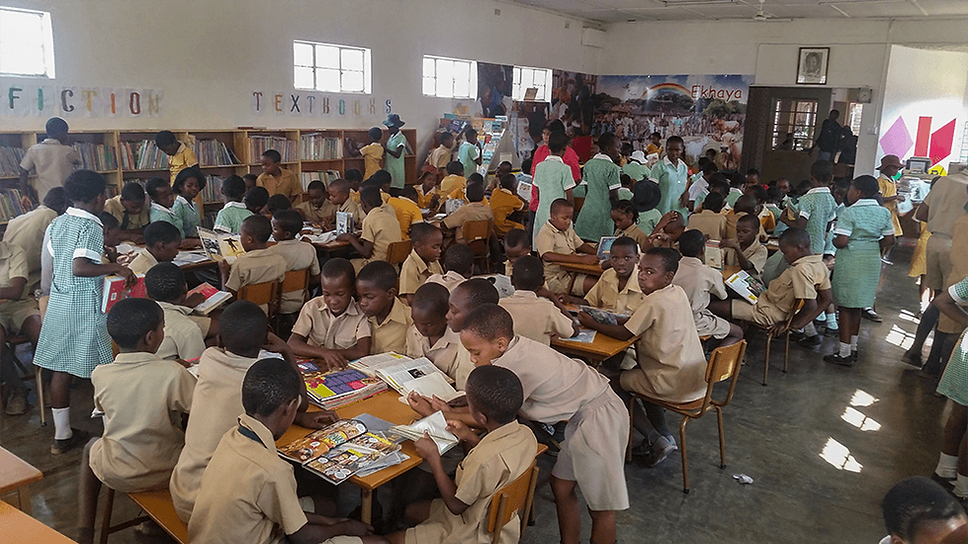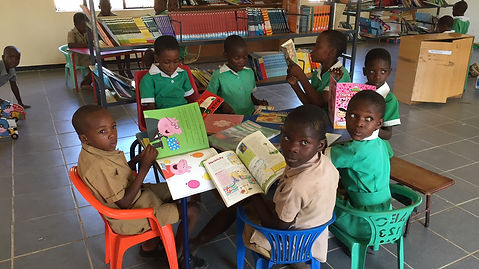
Our Impact: Making a Difference
Communities which have never before had access to books other than textbooks are experiencing a cultural and educational revolution as a reading generation develops. This now extends beyond the school to the adult population, who use the books to improve their lives.
Library in Gwanda Town - Adults
In the Gwanda town library, the largest group of users are students from the local Polytech, who are following courses as diverse as teacher training and auto mechanics. Other library users, many of them professionals upgrading their qualifications, are engaged in private studies through correspondence courses.
In 2021 a Memorandum of Understanding was signed with the Gwanda State University, newly established in Gwanda, to make use of our library. Secondary school pupils also visit in large numbers. For all of these students, the Library is able to provide textbooks and other reference materials as well as study desks for the vast majority who have no quiet study space where they live.
The trainees in various health professions, including nursing, based at the Gwanda hospital are regular users of medical books. The provision we are able to make for up-to-date materials has helped the school to become one of the best in the country. School leavers and other unemployed individuals visit the library for assistance in applying for courses. They also come to the Library for general reading materials and look at the newspapers.
In late 2021, the book stock of the library (including children’s books but not those in book boxes in rural schools) stood at just over 30,000. While textbooks are in demand, novels and other books read for pleasure or general knowledge are also well used, especially English bestsellers and novels in siNdebele. The library now has a wi-fi hotspot that benefits those who have no internet at home, a luxury which few enjoy.
Our staff also make outreach visits to expectant and nursing mothers who attend the hospital clinic. The aim of the visits has been to introduce the library and explain the importance of books and reading to their children.
Many subsequently visit the library when their children are old enough. Reading by our staff to children admitted to the children’s ward has been popular and some visit the library after discharge.
Because of the Library’s resources, Gwanda has become a desirable place for some people to live and work as they know that they are able to expand their horizons and advance their careers, and they have access to materials which can make them more effective teachers, health providers, or professionals in any field.

Literature students watch videos of their study material
Library in Gwanda Town – Children
The vast majority of children in Gwanda town have had access to books due to the efforts of the Edward Ndlovu Memorial Trust and its library services. Knowledge of the library has been spread by visits of staff to every school to encourage children to visit and become members if possible. This has resulted in some teachers bringing their classes for a tour and introduction to the books and the activities on offer.
As a result, many young people have come to enjoy reading. Furthermore, they have seen an improvement in their school performance and increased opportunities for advancement. Many children in Gwanda town participate in activities at the library during afternoons and school holidays, reinforcing their reading and developing application skills.
These take place in the afternoons on Tuesday, Wednesday and Thursday and include storytelling, crafts, drama, dance, writing, and even assistance with homework. These activities had to be suspended during COVID.
During 2020 we received over 5,000 visits from primary school children. The impact of COVID is seen when we compare this with just under 17,000 visits in 2018. Furthermore, all the 5 local schools in Gwanda town have become institutional members of the library and now receive at least one book box at their school in the same way that the rural schools do.
The loans through the schools and at the library totaled over 20,000 in 2018, indicating that we are definitely contributing to the development of a reading culture among the children, who borrow fiction and non-fiction books alike. Most of the students who proceed to college or university have spent time at the library from an early age.

The main Library is busy with children reading books
Improved Literacy in Rural Areas
75 rural primary schools received Book Boxes during 2021, 27 of them rotating, with different books each term, and 43 with permanent boxes with larger collections. Books are thus accessible to approximately 25,000 children, there being a total of 29,000 books in these boxes.
Schools have now become accustomed to receiving the book boxes and are making better use of them in their teaching. Heads of schools have also been persuaded of the importance of the books and all schools have signed MOUs with the Edward Ndlovu Memorial Trust.
Since there are so many variables at play in determining the achievement levels of children in school, it is difficult to claim unequivocally that improving literacy or exam pass rates in the schools we work with are due to the provision of books.
However, the fact that many communities where we are not working are clamouring to also participate in the book box programme does tell us that our work is deemed beneficial by communities in the district.
Assistance from Book Aid International made it possible for us to provide some books on a permanent basis to those schools beyond our capacity to serve with the rotating book boxes, thus extending the impact of our work to ten more communities.
We would welcome anyone who could undertake research which might establish whether there is a direct link between our library service and children’s educational attainment.

A lot of effort is being invested in reaching children in poor remote rural communities
Libraries Built in Rural Areas
It takes a great deal of effort in most poor rural communities to raise funds for any building venture, so when they decide to put that effort into creating their own library we know that we have made an impact.
Where teachers and parents alike previously believed that the only important book is a textbook, a change has taken place as they come to understand that much benefit comes from reading beyond the text – whether it be in improved grasping of the content of the text, being introduced to worlds and ideas beyond their own current environment, or simply achieving enjoyment not experienced before.
We believe that in this way the communities we work with have come to value greater knowledge and will have an improved quality of life.


Activities inside the Selonga Community Library, Gwanda South
A Model Created for Rural Libraries
Rural library service can be expensive where the population is scattered and transport is difficult. Different approaches have been attempted, from mobile libraries using buses or even donkey carts, to postal services.
We feel that by locating the libraries within the communities we have been able to have a greater impact on lives at minimum cost. But the training elements have been a necessary accompaniment to the mere provision of books, enabling the adults involved to gain ideas of how the books can enhance learning and quality of life in general.

Book Box arrives at a rural primary school
Income Generation for Rural Adults
We believe that in order to make a meaningful difference in rural communities, our library programme must contribute to economic and social development. Disposable incomes have been very low, but the generation of some cash through the study groups has made a significant impact on many families.
Typically, rural communities consist primarily of women, children and the elderly; the male family members may be in towns or are migrant workers in South Africa or elsewhere, and they are the ones who make decisions about the spending of household incomes. However, when those women participate in study groups they earn their own money and acquire their own assets, which they can dispose of to benefit the children.
They pay school fees, buy uniforms, purchase items for their homes, and feel more independent and able to plan for their own futures. At the same time they are seeing the benefits of moving from subsistence production to commercial production, which is not always stable in Zimbabwe, but more reliable and adaptable than erratic rain.
In order to assist the development of commercial production, ENMT has in the past three years been encouraging the creation and development of marketing associations. Once study circles have grouped together to market their produce more systematically, commercialization can become more permanent and successful. We believe we have travelled far enough down this road to ensure permanence, in spite of the vagaries of the Zimbabwean economy.

A study circle shows off a maize crop.
